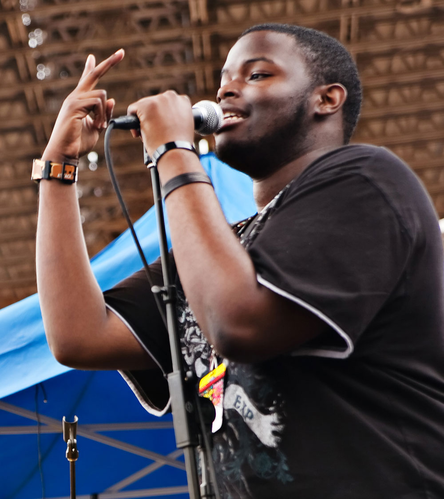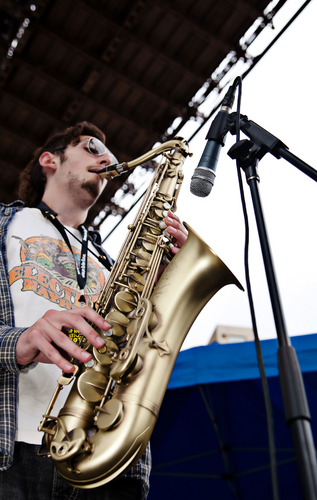The Dilla Ensemble Builds a Bridge to Brooklyn

Vocalist Jonquel Donte Holiday takes the mic as the J Dilla Ensemble performs in Brooklyn.
Photo by Deneka Peniston

A large and enthusiastic crowd watches the Dilla set. From right, trumpeters Emile Martinez and Joseph Streater.
Photo by Deneka Peniston

EWI player Anant Pradhan is flanked by bassist Marco Marcel McWaine and drummer Taylor Gordon.
Photo by Deneka Peniston

The J Dilla Ensemble blasts out its set in the shadow of the Brooklyn Bridge.
Photo by Deneka Peniston

Bassist Marco Marcel McWaine
Photo by Deneka Peniston

Tenor saxophonist Dane Orr
Photo by Deneka Peniston

From left, vocalists Jonquel Donte Holiday and Anna Wise
Photo by Deneka Peniston

Berklee's J Dilla Ensemble. Back, from left: Joseph Streater, trumpet; Jonquel Donte Holiday, voice; Taylor Gordon, drums; Marco Marcel McWaine, bass; Anant Pradham, tenor saxophone and EWI; Dane Orr, tenor saxophone and samples. Front, from left: Emile Martinez, trumpet; Lauren Fuller, keyboard; Anna Wise, voice; Phillipe Edison, tenor saxophone and EWI.
Photo by Deneka Peniston

The Brooklyn Hip-Hop Festival crowd get into the flow as the J Dilla Ensemble performs.
Photo by Deneka Peniston
Berklee students playing at major music festivals is nothing new. In the past year, they've played at the Newport Folk, Monterey Jazz, and Grey Fox Bluegrass festivals, to name three of many. Now, thanks to the enterprising efforts of faculty member Brian "Raydar" Ellis '05 and Berklee's J Dilla Ensemble, you can add the Brooklyn Hip-Hop Festival (BHF) to the list.
With Ellis and his students participating in the Brooklyn festival—New York's biggest hip-hop cultural event—the BHF organizers initiated a new educational component, and the Berklee contingent not only performed, but took part in panels focused on legendary artist J Dilla, the producer, composer, and MC whose work and memory were honored at the BHF.
"I think the ensemble is a great thing, especially coming from the musicianship perspective," said DJ Spinna, after hearing the group perform between the July 6 panels. "We're always talking about DJs and producers, but now Dilla has started a whole new thing starting with the love for his music. It's keeping the movement going."
The Bodega Education Initiative panels featured Ma Dukes (Dilla's mother), Q-Tip, Raydar, Wajeed (PPP), and DJ Spinna. The festival performances, held on July 10, featured—in addition to the J Dilla Ensemble—De La Soul, Black Sheep, and other hip-hop luminaries.
Detroit-born Dilla was primarily revered in the independent circuits, but his influence in classic hip-hop recordings was what made him a venerable producer, cultural icon, and legend. Four years after his death from lupus in 2006, at the age of 32, Dilla continues to inspire greater understanding of hip-hop through his extensive catalogue. Dilla worked with everyone from A Tribe Called Quest to the Pharcyde, and was nominated for Grammy Awards for his work with Common and Erykah Badu.
Raydar—who is busy as a producer, MC, and DJ while teaching at Berklee—started the J Dilla Ensemble as a music lab to engage students in the traditions of hip-hop. Ellis recognized the necessity of using Dilla's catalogue as a baseline to teach about music production, composition, and the use of sampling as fundamental building blocks to hip-hop.
"All the students already knew about Dilla's work," Raydar said during one of the panels. "Even on a gig, they would always find a way to slip in the 'Fall in Love' melody, even within their solo. . . I was trying to get a historic representation from a familiar starting point."
Berklee's Dilla Ensemble is the first endeavor of its kind to put an explicit educational slant and hands-on approach to preserving Dilla's music, and is the only Dilla course for academic credit in the world. Ellis's vision is twofold: to preserve the Dilla legacy and to teach new generations the intricacies and genius of Dilla's work. In the ensemble course, students are taught applicable skills in song composition by stripping Dilla songs to the core and reassembling them with live instrumentation.
The rigorous audition process forces students to flex their analytical and technical muscles. Ellis selects a Dilla song at random, no matter the obscurity, and the student must play it back. Students are selected based on their level of musical skill as well as their aspiration to learn about hip-hop.
"Hip-hop today is one of the most relevant fields of music that people can relate to. It's probably one of the most universal styles of music in the entire world now," said Anant Pradhan, an EWI player and tenor saxophonist in the student group. "J Dilla's music is a window to seeing a lot of other styles of music and use them in the most contemporary ways in the most practical medium that we have, which is hip-hop."
During its July 10 set at the BHF, the Dilla Ensemble recreated "The Light" (Common), "Didn't Cha Know" (Erykah Badu), and tunes Dilla produced for Janet Jackson, Busta Rhymes, and others. Starting with a familiar bass line or piano trill, the recognizable Dilla samples were creatively reassembled live on the stage overlooking thousands.
It's apparent that Dilla's legacy spreads beyond a college classroom. As tenor saxophonist and EWI player Dane Orr said, "Things like this are good for Berklee to see, but it's good elsewhere, as well. Any music that's been out for long enough will be studied. They codified jazz and made the Real Book. Raydar is working on that for a hip-hop: a Dilla Real Book."
Berklee is a pioneer in progressively expanding music curricula to include the once-vilified hip-hop genre. "The [Dilla] ensemble is allowing the student body to be very versatile because it's not many schools that allow you to explore the new current things that are happening in music," said Taylor Gordon, the group's drummer. "In colleges there is classical and there is jazz, but at Berklee they allow you to explore and be creative and reevaluate the past and make a new future."
